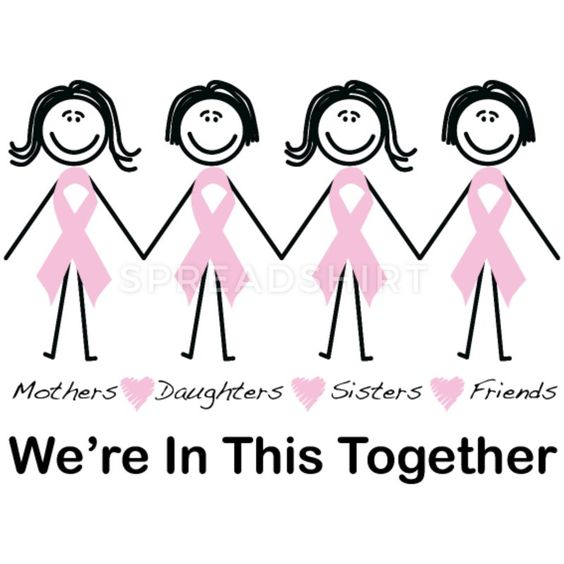
Supporting a Loved One Who Has Breast Cancer
After skin cancer, breast cancer is the most common cancer diagnosed in women in the United States. It can occur in both men and women, but it’s far more common in women. Breast cancer affects 1 in 8 women during their lives. Although breast cancer is still the most invasive cancer in women, survival rates are rising as screening and treatment improve. When someone has breast cancer it’s scary for them and their loved ones. The first thing that may come to mind is how you can make things easier or help her (or him) get through it. It doesn’t take much to be a good co-survivor, sometimes being there and listening is all the matters. If a friend or family member has been diagnosed with breast cancer, there are a number of things you can do to help or support them.
Supporting a Loved One Emotionally
Medications, side effects from treatment, and stress may contribute to feelings of depression, anger and tiredness. So be prepared for changes in your loved one’s behavior and mood. You should also encourage your loved one to be active and to do as much for themselves as possible. It will help them feel a sense of control. The best way of supporting a loved one emotionally through a hard time, like dealing with breast cancer is keeping them close and allowing them to express how they’re feeling whenever they need to. If it’s appropriate, holding hands or giving them a hug is a useful way of showing your support. If a loved one is feeling angry about their diagnosis, they may direct that anger at you. Although it can be hurtful, just remember it has nothing to do with you, they’re just upset about their current situation.
Facing Your Fears and Theirs
Survivors of breast cancer tend to have high levels of depression and anxiety. Even after treatment has ended, anxiety turns into fear of recurrence. So when offering support make sure you touch on the subject of fear and be open to hearing your loved one out. Reassure them that you are a safe person for them to discuss their fears and concerns. Let them know that it’s ok to be scared and that you are there to help support them. When someone is really feeling scared or upset it’s important to ask the right questions. What will help you get through this? What can I do to help? It’s important to acknowledge that even after treatment has ended, the fears may have not gone away – for everyone involved.
Offering to Help with Everyday Tasks
When you or a loved one is dealing with breast cancer there are a lot of ways to help out, show you care and make others aware. For instance, getting help on how to talk about tough subjects, making adjustments, dealing with change, staying flexible and staying open and honest with each other about feelings, needs and expectations. During treatment many people want to carry on by doing as much as possible, but side effects can often make it more difficult to continue with everyday tasks. Think about what you’re able to do and how much time you’re able to commit. Instead of asking general questions on how to help, ask more specific ones. Some things you may offer to help with include – taking the children to or from school; babysitting; cooking meals to store in the freezer; cleaning; washing clothes and ironing; or transporting to and from hospital appointments.
How To Keep Your Worries From Taking Over
A loved one’s illness can be stressful for you too, so it’s important to try and keep a positive attitude. Find activities that can help you relax, such as walking, practicing meditation, getting a massage, painting or exercising. Exercising is a great way to fight tension and can help your body be better prepared to deal with stress. Get as much rest and sleep as possible. Your body needs time to recover from stressful events. Join a support group for family and friends of people with breast cancer. Talking about what you’re going through with other people who understand what it’s like, may be a huge help.
Think Before You Speak
Even people who mean well can say insensitive or inappropriate things. People make comments that are well intended, but often come from a place of awkwardness, discomfort, and even fear. Avoid making the following statements:
- They’re just boobs. Boobs are a huge part of women’s femininity, their sexuality, and even their identity. Instead express how sorry you are that they’re going through such a tough situation and offer your support.
- It’s just hair. Losing an aspect of their individuality and having to define their look can be extremely difficult. Instead ask them if they would like to talk about the hair loss and show them you empathize.
- What are the odds? Asking someone with cancer a question like this is very invasive. Instead ask about their treatment plan or when their next doctor’s appointment is. They’ll let you know if they want to share.
- You can’t be sick, you look great. Just because a cancer patient doesn’t look sick doesn’t mean they’re not very sick. Instead ask how they’re felling or if you can come by and visit anytime of the week.
- Move on and let go. Quit dwelling on it. Who are you tell someone when and how to stop dealing with their pain? Instead ask them to help you understand what they’re going through.







